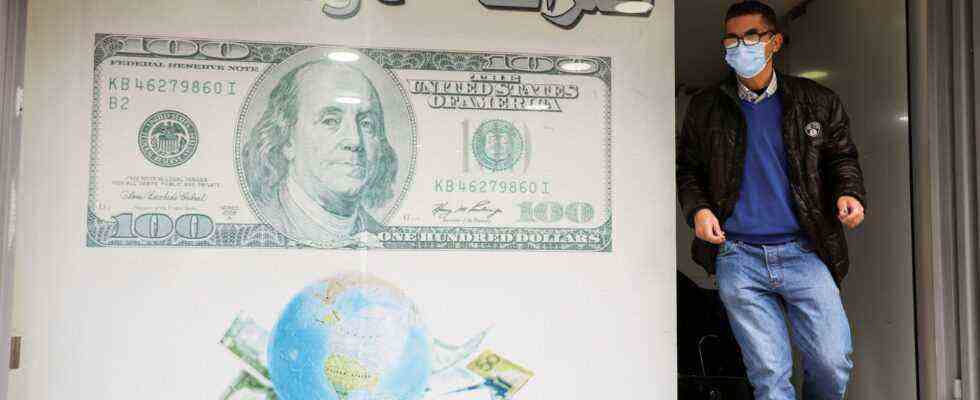As of: 01/29/2022 8:07 p.m
Lebanon is in a deep economic crisis. Savings lose value every day. That’s why many invest in cryptocurrencies – and thus in a system that only a few really understand.
The bitcoin is silent. The cryptocurrency is thus in contrast to the situation in Lebanon. In recent years, this has been determined primarily by one thing: noise. The explosion in the port of Beirut; recurring protests; endless political discussions. Bitcoin, on the other hand, is quietly making its way into Lebanese society.
Mario Awad is a trader, i.e. a dealer. It gives people access to Bitcoin and other cryptocurrencies. “Actually, everyone buys from me: students, middle-income people, the rich. Everyone wants to invest in crypto,” says Awad.
Lebanese no longer trust banks
In the case of cryptocurrencies, to put it simply, files are traded as currency. What makes them special: They are stored decentrally, i.e. not at a large bank. Above all, proponents see a huge advantage in this, in contrast to conventional money. “Sometimes my cell phone rings in the middle of the night,” says Awad, who has been in the business for five years. “Of course I don’t answer it. But the demand is huge. People want to buy every day. It doesn’t matter what time it is.”
The reason for this is simple: the Lebanese pound has lost an enormous amount of value in the space of a year. On average, you now have to put more than three times as much money on the table for a product as you did a year ago. And so a large part of the population has trouble finding even the most necessary products for everyday life.
Fixed exchange rate brought about the collapse
Henri Chaoul is a financial expert specializing in the banking system in Lebanon. He is convinced that the main problem is that the exchange rate between the Lebanese pound and the US dollar has long been fixed. “In this way, people maintained a lifestyle that they would otherwise not have been able to afford. When all of a sudden no more payments from outside came into the country during the crisis, the system simply stopped working,” explains Chaoul. “The banks closed, people wanted to withdraw their savings – but because the banks had no existing reserves, the system collapsed.”
Bitcoin does not need banks or governments. This is one of the reasons why something like a gold rush mood has broken out among some Lebanese with regard to the cryptocurrency. Just like Bassam Saadeh. He has been investing in cryptocurrencies for a long time and understands why many of his compatriots are doing the same: “Since the crisis, people here have been taking more risks. And so they sometimes make bad decisions or take too much risk. Or they make completely excessive decisions with Bitcoin hopes without really understanding the dangers.”
Saadeh has lost money himself. The 36-year-old bought Bitcoin for the first time in 2015. He just wanted to try something back then – not because of the crisis, but because he’s always interested in new things. “Back then I was still dealing with some 17-year-olds who came by on their motorcycles. I had a big chunk of money with me. It felt kind of illegal.”
US dollars in cash is all that matters
For Saadeh, Bitcoin is a real alternative to the Lebanese pound, not just a pipe dream. After protests in 2019, banks introduced capital controls, making it impossible to withdraw and transfer dollars. Today, you can only withdraw your savings in Lebanon in lira – with strict monthly caps and at a fixed exchange rate.
“If you had US dollars in your account before the crisis, the money is now blocked. We call it ‘Lollar’: Lebanese dollar,” explains Saadeh. The “Lollar” no longer has any value. But if you manage to get US dollars in cash, then you are liquid again because you can still get goods reasonably cheaply in everyday life. And the point, according to Saadeh, is: “Crypto means fresh dollars. The money isn’t in the Lebanese financial system. It’s out in the world.” You can trade it, buy electronic devices with it. “Even the gold dealer here takes the money. And you can sell it on the black market. So crypto is fresh – liquid so to speak.”
Crypto “mining” exacerbates crisis in Lebanon
Ironically, the boom in Bitcoin and other cryptocurrencies is compounding the crisis in Lebanon. Because – to put it simply – you can produce cryptocurrencies yourself. In so-called “mining”, a computer solves complicated arithmetic tasks and thus participates in the creation of money. But extremely powerful computers and their cooling also consume an extremely large amount of electricity. Lebanon has one of the lowest electricity prices in the world – because the state pays a large part of the bill. And so many Lebanese bitcoin miners are draining the country’s already overburdened energy grid – and state finances.
For many Lebanese, everyday life is difficult and the future is more than uncertain. They try to save what can be saved. “People believe that even worse times are coming in the future. You can either stuff your money under the mattress, invest in crypto or buy gold,” says Saadeh. Like crypto trader Awad, he doubts whether cryptocurrencies are really the solution. But at least they offer them a little hope. And that’s what many people in Lebanon are desperately looking for – also in the digital world.
Bitcoin in Lebanon: the crypto revolution
Tilo Spanhel, ARD Cairo, 17.1.2022 3:59 p.m

